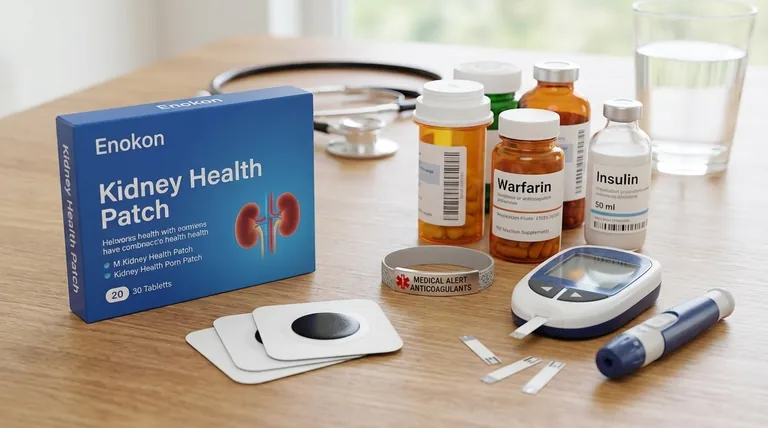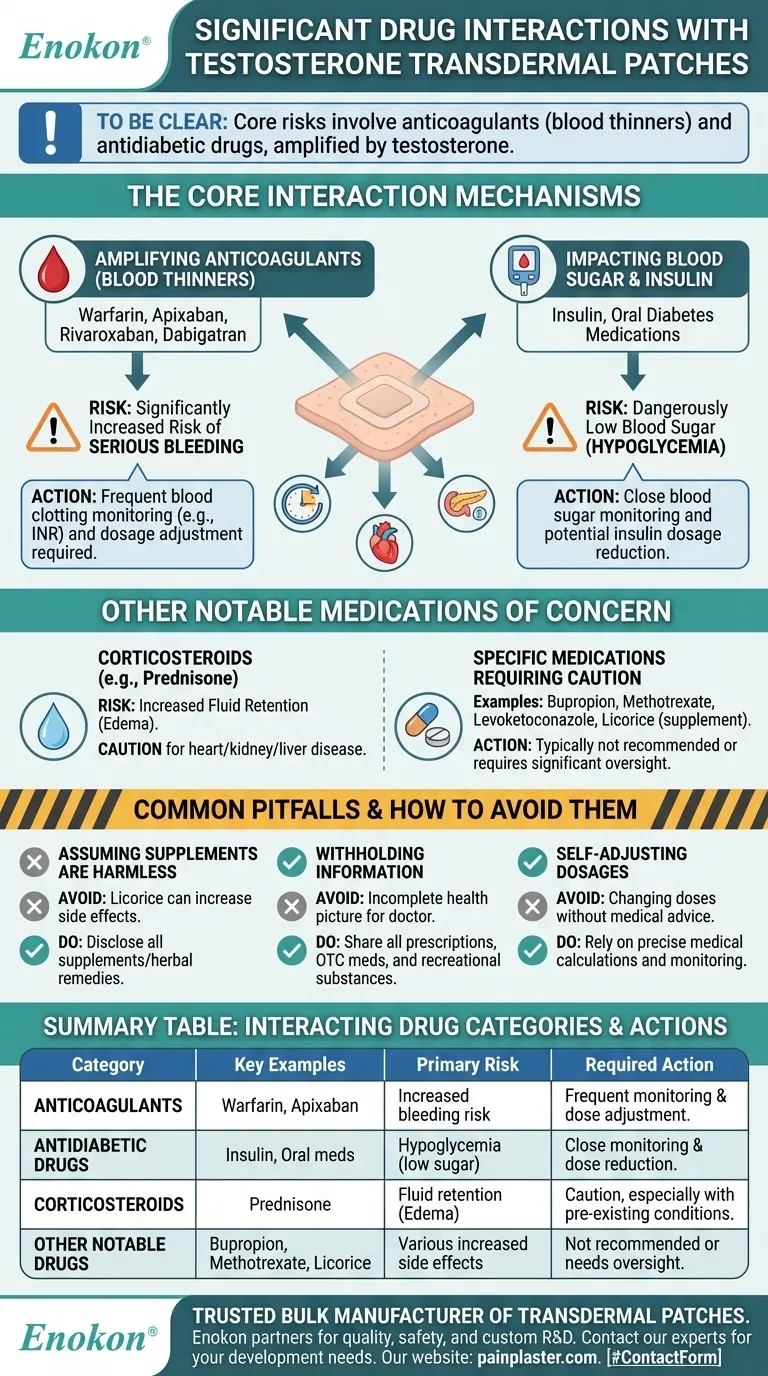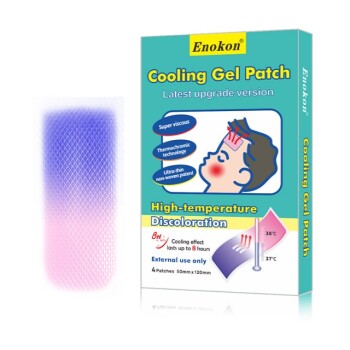To be clear, the most significant drug interactions with testosterone transdermal patches involve medications that alter blood clotting and blood sugar. Testosterone can amplify the effects of anticoagulants (blood thinners) and antidiabetic drugs like insulin, creating a serious risk of bleeding or dangerously low blood sugar if dosages are not carefully managed by a physician.
The core issue is not simply a list of interacting drugs, but how testosterone therapy systemically affects the body's response to other critical medications. Understanding that testosterone can enhance the potency of certain drugs is the key to managing your health safely under medical supervision.

The Core Interaction Mechanisms
Testosterone is a powerful hormone that influences numerous bodily processes. When introduced via a transdermal patch, it can alter how your body metabolizes and responds to other essential medications.
Amplifying Anticoagulants (Blood Thinners)
Testosterone can increase the activity of oral anticoagulants. This is the most critical interaction to be aware of.
These medications include warfarin, apixaban, rivaroxaban, and dabigatran. By enhancing their effect, testosterone significantly increases the risk of serious bleeding.
Your physician must monitor your blood clotting factors (like INR for warfarin) much more frequently when starting or stopping testosterone therapy to adjust your dosage accordingly.
Impacting Blood Sugar and Insulin
Androgens like testosterone have been shown to decrease blood glucose levels.
For individuals with diabetes, particularly those using insulin or other antidiabetic drugs, this can be a serious concern. The previous, correct dose of insulin may become too high, leading to hypoglycemia (dangerously low blood sugar).
Your doctor will likely need to monitor your blood sugar closely and may need to reduce your insulin dosage to maintain safe levels.
Other Notable Medications of Concern
While the primary risks involve anticoagulants and insulin, several other classes of drugs require careful management and physician oversight.
Corticosteroids
When testosterone is used concurrently with corticosteroids (like prednisone), there is an increased risk of fluid retention, known as edema.
This combination can be particularly hazardous for patients with pre-existing heart, kidney, or liver disease.
Specific Medications Requiring Caution
A number of other drugs are generally not recommended for use with testosterone or may require significant dose adjustments.
These include the antidepressant bupropion, certain cancer therapies like methotrexate and mercaptopurine, and antifungals such as levoketoconazole. Concurrent use with fezolinetant or tranexamic acid is also typically not recommended.
Common Pitfalls and How to Avoid Them
Navigating testosterone therapy safely requires a proactive approach to your entire health profile, not just the hormone itself.
Assuming Supplements are Harmless
Even non-prescription substances can cause issues. For example, regular consumption of licorice can increase certain side effects when combined with testosterone therapy.
Always disclose all supplements, vitamins, and herbal remedies to your healthcare provider.
The Danger of Withholding Information
The only way your doctor can protect you is if they have a complete picture of your health.
This includes all prescription drugs, over-the-counter medications, recreational substances, and supplements you are taking.
Self-Adjusting Your Dosages
Never attempt to change the dose of your testosterone or any interacting medication on your own.
These adjustments require precise medical calculations and careful monitoring of your body's response to prevent severe adverse effects.
Making the Right Choice for Your Health
Your safety depends entirely on transparent communication with your healthcare team. The goal is to ensure all your medications work together as intended.
- If your primary focus is managing blood clotting with anticoagulants: You must commit to more frequent blood tests and work closely with your doctor to adjust your dosage, as your risk of bleeding is heightened.
- If your primary focus is managing diabetes: You need to monitor your blood sugar levels diligently, as testosterone can cause them to drop and may require a reduction in your insulin or other medication.
- If your primary focus is overall safety: Provide your physician and pharmacist with a comprehensive and updated list of every substance you take before starting testosterone therapy.
Proactive and honest communication with your healthcare team is the single most important factor in ensuring the safety and success of your testosterone therapy.
Summary Table:
| Interacting Drug Category | Key Examples | Primary Risk | Required Action |
|---|---|---|---|
| Anticoagulants (Blood Thinners) | Warfarin, Apixaban, Rivaroxaban | Increased risk of serious bleeding | More frequent blood clotting (INR) monitoring and dosage adjustment. |
| Antidiabetic Drugs / Insulin | Insulin, Oral Diabetes Medications | Dangerously low blood sugar (hypoglycemia) | Close blood sugar monitoring and potential insulin dosage reduction. |
| Corticosteroids | Prednisone | Increased risk of fluid retention (edema) | Caution, especially for patients with heart, kidney, or liver disease. |
| Other Notable Drugs | Bupropion, Methotrexate, Licorice | Various increased side effects | Typically not recommended or requires significant physician oversight. |
Ensure the safety and efficacy of your transdermal therapy products.
As a trusted bulk manufacturer of reliable transdermal patches and pain plasters, Enokon partners with healthcare and pharmaceutical distributors and brands to deliver quality and safety. Our technical expertise supports custom R&D and development, ensuring your products meet the highest standards.
Contact our experts today to discuss your transdermal patch development needs and how we can help you bring safe, effective products to market.
Visual Guide

Related Products
- Prostate Pain Kidney Health Care Patch for Men
- Far Infrared Heat Pain Relief Patches Transdermal Patches
- Medical Cooling Gel Patches for Fever Cooling Patches
- Heating Pain Relief Patches for Menstrual Cramps
- Capsaicin Chili Medicated Pain Relief Patches
People Also Ask
- What should be done if a testosterone patch falls off? A Guide to Maintaining Hormone Stability
- What is the purpose of testosterone patches? A Steady Solution for Low Testosterone
- What lifestyle factors should be considered when choosing between testosterone patches and injections? Find Your Best Fit
- What should be done before undergoing an MRI while using testosterone patches? Remove it to prevent serious burns.
- How often should testosterone patches be applied? Daily Dosage & Best Practices















